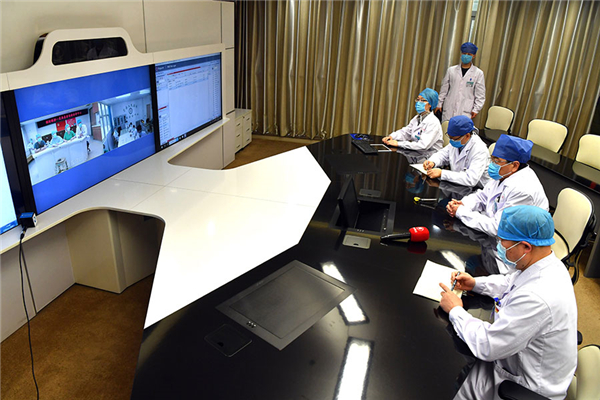

Doctors of Henan Provincial People's Hospital provide online diagnosis in the fight against the novel coronavirus epidemic in Zhengzhou, capital of Henan province. [Photo/Xinhua]
Internet-based medical enterprises in China have come up with several new services like free online consultations and livestreaming by renowned professionals to address health queries and help the country in its fight against the novel coronavirus epidemic.
Internet medical service platforms like Ali Health, Ping An Good Doctor and Dingdang Kuaiyi have joined hands to offer these services, which are already gaining considerable traction among the general public, experts said. According to Ali Health, during the first 24 hours after its mini consultation service was launched online, it attracted nearly 400,000 visits.
Chen Qiaoshan, a healthcare analyst at Beijing-based market consultancy Analysys, said: "The fight against the novel coronavirus outbreak has brought new growth points for the internet-based medical sector. Since the epidemic entered a high incidence period during the Lunar New Year, most of the people are now staying at home to avoid cross contamination. Online consultations are now the top choice for the public."
She said that most of the internet medical companies are capable of meeting the current requirements by making full use of their unique advantages in rapid responses to online consultation, remote isolation, and diversion before consultation.
Data from app tracker Analysys Qianfan show that during the Lunar New Year holiday, the daily active users for single online medical consultation apps peaked at 6.71 million, with the biggest increase being 1.6 million, or a 31.28-percent growth on a yearly basis.
More than 10 internet-based healthcare enterprises, such as WeDoctor, haodf.com and dxy.com, have also joined efforts to launch a free online consultation platform in Hubei province, the epicenter of the outbreak in China.
According to WeDoctor, by Wednesday noon, its free consultation platform accumulated over 86.89 million visits. A total of 18,776 physicians have offered medical consultation services to 986,100 visitors.
"Free consultation services offer great opportunities for online medical firms to attract new customers. In addition, due to the decrease in entertainment activities and continuous media publicity, internet-based medical apps have managed to maintain high user stickiness," Chen said.
The medical e-commerce sector has also seen a boom. Due to shortage of products like facial masks, surgical alcohol and preventive medicines, consumers are turning to medical e-commerce platforms.
According to Analysys Qianfan, from Jan 24 to Jan 30, the daily active user peak in the sector reached 1.48 million, and the highest daily compound growth rate of daily average users during the period was 8.27 percent.
Pang Chenglin, general manager and executive director of Guizhou-based 39hospital.com, said that "through online consultations, the public have become increasingly aware of the benefits of internet healthcare, and their trust accumulated."
"Building an online doctor-patient relationship based on trust is fundamental to the development of the sector," Chen from Analysys said.
"Besides, the fight against the virus has prompted us to boost our technology and research and development efforts. During the Lunar New Year holiday, which was a high incidence stage, we had been working day and night to optimize our products, so that more people could be able to consult online," Pang said.
On Jan 26, Guizhou-based internet medical company Longmaster-the parent company of 39hospital.com-and Ping An Insurance (Group) Co Ltd launched a 24-hour online platform to offer video and image consultation services for free. By Tuesday, the platform had accumulated more than 500 volunteer respiratory physicians.
On Monday, the National Health Commission issued a guideline on the epidemic prevention and control which said that medical institutions should take advantage of internet-based healthcare to release the pressure on offline clinics. Internet-based hospitals are encouraged to offer medical services and drug delivery services to lower infection possibility, it said.